Support strong Canadian climate journalism for 2025
Conservative Leader Andrew Scheer appeared in the halls of Canada’s seat of power Friday, walked up to the microphone and cameras waiting for him to address a national audience and told those who have been standing in solidarity with the Wet'suwet'en to “check their privilege.”
The Gidimt’en camp of members of the Wet'suwet'en Nation told National Observer that kind of statement is "racist and absurd" when many Indigenous communities have been discriminated against or lack access to basic services.
Scheer was responding to the news this week that blockades of key rail lines — in protest of the RCMP’s arrests of Wet’suwet’en members in British Columbia in order to clear the route for a gas pipeline — are putting pressure on some industry employees.

He seized on numbers cited by transportation-sector union Teamsters Canada that “up to 6,000 workers” could be out of work as a result of a decision by Canadian National (CN) Railway to shut down eastern operations, as well as Via Rail’s cancellation of passenger-train service across the country. More than 400 trains have been cancelled in the past week, CN has said.
“These protesters, these activists, may have the luxury of spending days at a time at a blockade, but they need to check their privilege,” Scheer told reporters, who had gathered outside the House of Commons chamber on Parliament Hill in order to broadcast his views.
“They need to check their privilege, and let people whose jobs depend on the railway system, small businesses and farmers do their jobs.”

Asked what she thought of Scheer's statement, Molly Wickham, spokeswoman for the Gidimt’en camp of Wet'suwet'en Nation members, said the Tory leader's words made little sense.
"All of Canada is subsidized by Indigenous people. All Canadian industries and transportation infrastructure rely on the theft of Indigenous land for their existence," she said. "Calling Indigenous land defenders 'privileged' when so many of our communities are denied basic human rights and services is racist and absurd."
Two examples of Indigenous human-rights issues include the Canadian Human Rights Tribunal decision that Ottawa was "willful and reckless" with First Nations children who suffered racial discrimination and unnecessary separation from their families, as well as the fact that there are still 60 long-term drinking-water advisories on reserves despite the United Nations recognizing clean drinking water as a human right.
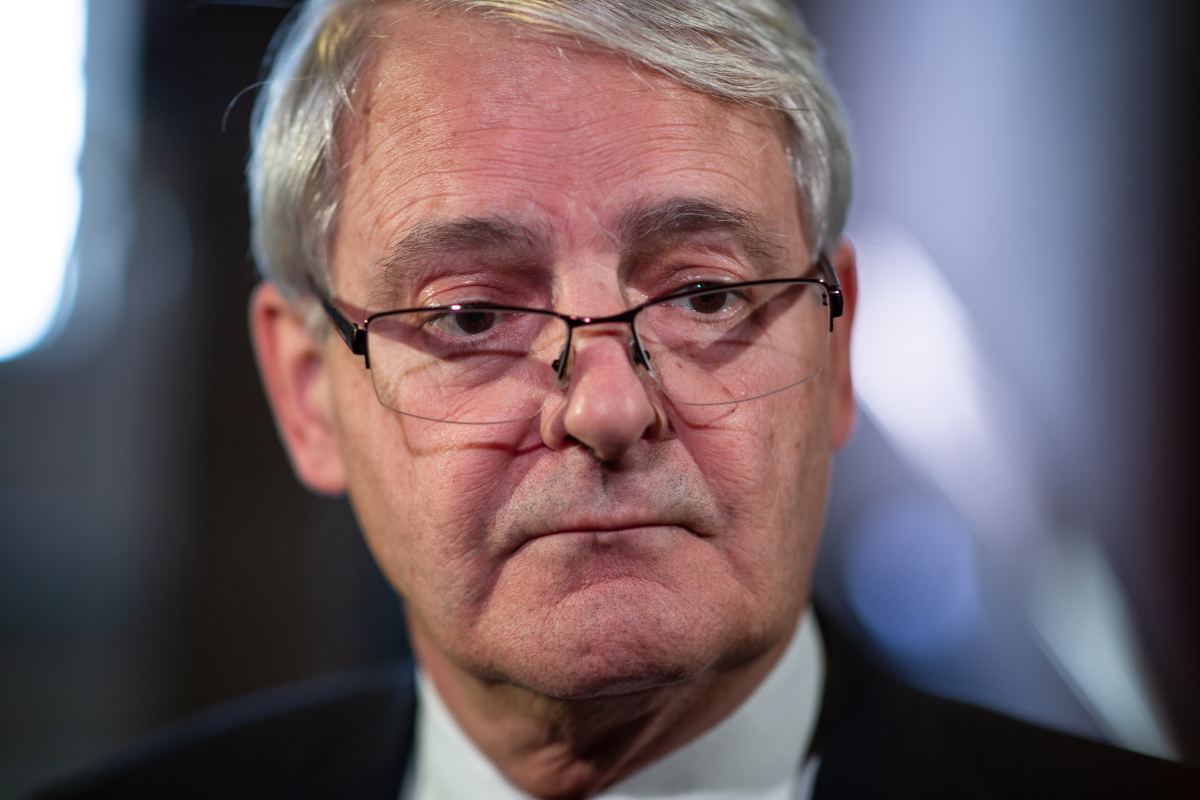
Miller to meet with Mohawk nations: Garneau
Protests have erupted in multiple provinces after the RCMP moved on Wet’suwet’en territory, arrested matriarchs, sawed apart gates and extinguished sacred fires.
A blockade in Manitoba has ended, but National Observer reported another in British Columbia has sprung up near Vancouver, just as a third near New Hazleton, B.C., appeared to be winding down. Meanwhile, near Tyendinaga Mohawk Territory east of Belleville, Ont., negotiations have been ongoing with the Ontario Provincial Police over a fourth rail blockade.
Transport Minister Marc Garneau, who spoke to media in downtown Toronto on the sidelines of an annual meeting with his provincial and territorial counterparts Friday morning, said “the path to resolution of this issue is through dialogue and seeking consensus.”
Garneau confirmed Indigenous Services Minister Marc Miller would be meeting “very shortly” with Mohawk representatives to discuss the issue. He insisted the government has been “working every day, ever since this happened,” to engage with CN, Via and Canadian Pacific (CP) Railway, as well as provincial counterparts.
“We’ve been actively engaged on trying to find the best solution, as quickly as possible,” he said.
Late on Friday, Mohawk representatives announced that Miller would be meeting Saturday morning with them at the rail crossing in Tyendinaga Mohawk Territory, to address issues and “polish the Silver Covenant Chain,” which represents the original agreements between Mohawks and the Crown.
"Indigenous and non-Indigenous supporters alike are welcome to travel to Tyendinaga tomorrow to witness the historic event," they said in a statement.
The “vast majority” of goods used by Canadians and bought in stores “travel by rail,” Garneau said. The disruption also affects people who rely on passenger rail service to work or travel to see family, he added. “The impact of this disruption affects each and every Canadian.”
Garneau also said “freedom of expression and peaceful protest” are among Canadians’ most fundamental rights, and should be respected, but he was “deeply concerned” that the blockades were preventing the operations of railways.
“There is a risk of seeing this solely as being about a negative impact on the profitability of large companies,” Garneau said. “But it is about people's jobs and livelihoods, and about the transport of key supplies like food, propane, heating oil and chemicals for water treatment, agricultural products for export and so many other products.”

'Law enforcement should enforce the law': Scheer
Scheer also acknowledged that all citizens “have the right to demonstrate peacefully and to express themselves freely,” but said that doesn’t mean they have a “right to paralyze our rail network and our ports.”
He tried to portray the situation as one of “a few activists” being able to shut down “an entire aspect of our economy,” and claimed that those manning the blockades are hurting their own cause. “They’re doing it wrong,” he said.
“For many of these anti-energy activists, this is just a warm-up act,” said Scheer. “This is just a warm-up act for fights like TMX (the Trans Mountain oil pipeline expansion project) and Teck Frontier (a proposed $20-billion oilsands mine). In the end, their goal is the shutdown of our entire energy sector.”
The outgoing Tory leader spent a large portion of his appearance in front of media calling on the RCMP to “enforce the law.”
Pressed repeatedly to explain what specific actions he meant by that, Scheer would not elaborate.

“The RCMP act is clear: the minister of public safety has the ultimate authority over Canada’s national police force, and has the power to direct the RCMP to enforce the law,” he said.
“Pick up the phone, call (Public Safety) Minister (Bill) Blair, and tell him to put an end to this situation," he said, aiming his remarks at Prime Minister Justin Trudeau.
Asked if he meant the RCMP should breach areas where it does not have jurisdiction, Scheer said he didn’t mean that.
“I’m calling on the prime minister to act as prime minister, to make sure that he uses all the tools in his toolkit to enforce the law. Where it’s RCMP jurisdiction, they should intervene,” he said.
“Law enforcement should enforce the law.”
Editor's note: This story was updated on Feb. 14, 2020 at 6:01 p.m. Eastern to include a statement from Mohawk representatives.

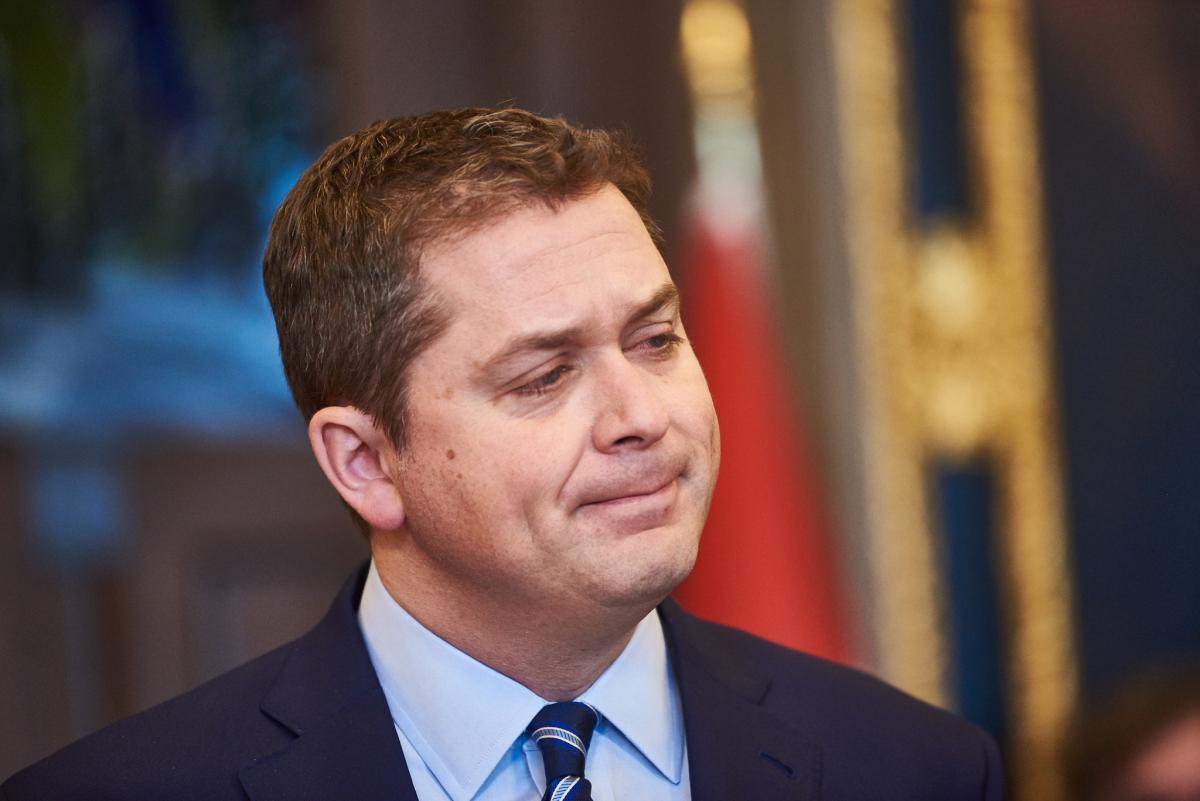



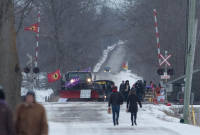

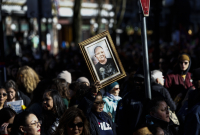
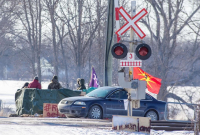
Comments
A reaction from First Nations was predictable. On top of that, it sounds like Scheer said you have to support megaprojects because you're white. That would make it racist both ways.
The spokesman for corporate Canada and Bay St tells protestors, including First Nations who have suffered decades of oppression, to check their privilege. Can't make this stuff up.
Colonialism is alive and well in Canada's highest political and corporate offices. That's where your problem starts, Mr. Scheer.
Ottawa and the provinces have had years to negotiate with First Nations, act on Supreme Court decisions, recognize aboriginal title, and implement UNDRIP principles. Unless Ottawa and the provinces start dealing squarely with First Nations — which are both nations and first — expect resistance to grow.
Easy to condemn Scheer's aggressive posturing, but Horgan's recalcitrance and Trudeau's hypocrisy are just as bad. A pox on all their houses.
If you want the trains to run, stop oppressing First Nations.* It's that simple.
*My original phrasing was less diplomatic.
Agreed. Completely. I’m encouraged though by the numbers of non-Indigenous people who are essentially saying “Not in my name,” who are getting out marching, rallying, and supporting Indigenous actions. And the solidarity statements from teachers federations, unions, faith groups and others are powerful. Cautious optimism here: maybe a shift is occurring. Maybe more Canadians are more aware of our history and can peer through the racism. And kudos to the National Observer, the Narwhal and others who are keeping this stuff illuminated.
Such incredible two-faced hypocrisy and egotism from our politicians:
-What we need is a negotiated consensus -- as long as it forms around our position, no matter the harms!
-There's no relationship we value more than the one with our indigenous peoples -- as long as they get the heck off their land and let us ram a pipeline through!
-We're declaring a climate emergency!! -- and we'll get right on that, after we've advanced yet another fossil fuel mega-project and pipelines galore!
-Our children are our future! -- but let's not leave them any hope of a survivable planet, if there's money to be made!
-Super-natural BC! - now let's get fracking! Screw the tourism sector! What's another summer full of raging wildfires and smoke-filled skies, after all?
All these puffed up politicians, full of concern for the "little people" who can't get to work because of protests. Of course people are protesting! Their futures are literally being auctioned off to the fossil fuel industry. Time to wake up and smell the petrol fumes, men. Negotiate a solution which doesn't rely on continued ignorance of the accelerating climate disaster you have been bringing upon us all for the last 5 decades! Then your people can get to work, and have a hope for their own futures too, and that of their children. Ignorance of the laws of physics won't protect us all from their consequences.
Mr. Scheer, please pack up your bags and go far away, and think about your incredible fatuous harmful ignorance. And don't ever talk again, unless you have something intelligent to say. For shame.
kudos for every word in that comment D Senzi And I second it and raise you with an "ok Boomer"
Amen to valerie losell's response to D Senzi.
I'm a Boomer, and FWIW most of the people I know who are my age are on the side of reconciliation and climate progress ... maybe the young could find another insult specifically applicable to Stupid People.
Only a few of the Boomers got rich on the despoilation of the land, water, food and air. In the main, the whole show was put in place by the War generation. And most of the people in that generation didn't profit, either.
BTW, I find the "OK Boomer" thang to be ageist ... and to neglect that we are now the generation that was there, and can call BS to aspects of the Official Story about numbers of things.
In this case, I recall when the people of BC elected an NDP government. Railway cars for shipping lumber suddenly were unavailable. The day after the next election, the cars started rolling again. So many were available, there wasn't lumber to fill 'em. So what's this about they can't find room to park a few trains: certainly they managed back then!
Ten "thumb's up," D Senzi!
I have not read everything written about the Coastal Gas Link pipeline, so please pardon my ignorance but: why is that this pipeline has to traverse indigenous lands hitherto relatively free of white desecration? Is it truly the only available route? (I'm aware of the unforgiving barriers of the Rockies et al.) Or, is it the route that won't disturb the white ownership of alternative routes?
Too, often, indigenous lands, reserves, etc have been chosen by colonial industry to bear the burden of colonial waste, toxins, or, conversely, the wastrel exploitation and despoliation through expropriation for the enrichment of the extraction executive sector (rather proud of that string of "ex" alliteration!) Ah ha! NIMBY on a capitalist industrial and globally racist scale!
"why is that this pipeline has to traverse indigenous lands hitherto relatively free of white desecration? Is it truly the only available route?"
Thanks for being interested in this issue, Betsy!
There are indeed alternative routes. In fact, the Wet'suwet'en Hereditary Chiefs have suggested them, nay PLEADED for them! In one case, Coastal GasLink ploughed a road through an important Wet'suwet'en cultural and suspected burial site, ignoring pleas that they re-route. In another case, they are running through a valley that is the drinking watershed for a $2,000,000 Wet'suwet'en addiction treatment centre — again, pleas to re-route were ignored. The healing centre was not even noted in the Coastal GasLink environmental impact study! When queried by the press about what would happen if there was a pipeline problem in the valley, Coastal GasLink said they would "ship in bottled water" to the healing centre — PREPOSTEROUS!
Coastal GasLink obtained permits with little or no "meaningful consultation," relying on industry consultants and having NO Wet'suwet'en elders involved in their cultural and environmental reports.
When the Wet'suwet'en politely said they needed to be consulted on these things, Coastal GasLink went to court to obtain an injunction to enforce permits that were improperly and possibly illegally obtained.
It is not often mentioned in the popular press that the Hereditary Chiefs have repeatedly offered alternative routing, and that such advice has, in most cases, not even been acknowledged!
"Meaningful consultation," indeed. It's payback time.
Thanks for this information, Jan Steinman. TCEnergy ( formerTCPL) used similar tactics with the Energy East Pipeline. They wouldn’t even consider a route that would have kept it away from our water source., ( Many of us didn’t want that anyway.. why threaten someone else’s watershed?) But the point is that they seem to have no concern about water. None. In 2020. With climate change coming on like a freight train.
The land is hardly free of colonial waste, toxins, etc. Not long ago, there were no fish in the Morice Lake because of mercury pollution.
Much of it is logged off, so flooding happens regularly. Riverbeds have been plowed out with caterpillar tractors. Because of the flooding, then the river had to be diked.
The lands in question are not reservations, but unceded lands: there were no treaties, so title was not expunged. The whole issue of consultation is around the reservation governance being consulted, rather than the people who have the right to govern the unceded lands. The whole thing is, IMNSHV, pretty disgusting. Apparently at least some of the band individuals who signed the TMX agreement were paid ISTR the amount being $30K ... and in some cases that was for ppl who didn't know what they were signing, and signed with a "mark" because they were unable to write their names.
The concern is not just the water for the healing centre, but for the whole area drained by the rivers the pipeline crosses. My understanding is a gas leak behaves differently from an oil leak: it shoots a huge flame into the air -- in the middle of timber country, that because of logging-off of other parts now floods in spring and burns in summer.
Just as in TO we get our drinking water from Lake Ontario, in central and northern BC, the drinking water comes from the lakes and rivers ... whether directly, or by way of the water table.
We have a pipeline passing right through a subway station in Toronto. Seriously.
We have a plant that "packages" radioactive material in the heart of a residential neighbourhood -- a poorer neighbourhood. They don't do these things in the areas where the wealthy have their estates.
Housing for the poor is built on "remediated" contaminated land. I.e., they dig a pit, bury the top part under what used to be the under layer, and prohibit planting of trees and shrubs that might bring the toxins to the surface. That's how industrial sites are "cleaned."
If the First Nations people were wealthy political donors, their land would be safe too. As long as they donated more than the fossil fuel or mining industries.
PS: Bottled Water ... yeah: that'll bring back the fish, and restore dignity to the women and girls messed around with by the inhabitants of the "man camps" that are featured on every new big development.
Didn't this guy just soil his own bed and exit stage right? Actually, wasn't he more-or-less forced out of the Conservative Party, due to his homophobic and racist talk?
Talk about "privilege," isn't this the guy whose kids were attending private school, thanks to his illegal mis-appropriation of Conservative Party funds?
Just when you thought all the irony was south of the 49th…
And when the fracked gas runs out after a few years then what? Oh look! We have a pipeline and a deep-water port. Lets not let it go to waste. Lets put dilbit in the pipe, but first we'll need to build a bigger pipe. There will be lots of jobs, jobs, jobs.